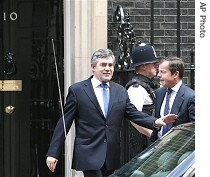-
(单词翻译:双击或拖选)
London
25 July 2007
Britain's Prime Minister Gordon Brown unveiled in parliament Wednesday new anti-terror measures he would like to see implemented2 in the coming months. For VOA, Tom Rivers reports from London.
 |
| PM Gordon Brown departs 10 Downing Street for the House of Commons, 25 July 2007 |
Mr. Brown said they are needed to confront what he called a generation-long challenge to defeat al-Qaida inspired terrorist violence. The British leader said some of the new measures would be incorporated into the forthcoming counter-terrorism bill.
He also said that, under the proposals, electronic screening of people coming in and out of Britain would be required.
"Within nine months, from March next year, we will extend biometric visas to all visa applicants," he said. "From 2009, we will introduce a new enhanced system of electronic control linking the checking of passports to checking against the warning index."
The prime minister also said the separate functions of passport control, customs and policing at entry points like airports would soon be combined into a single, unified4 force.
"We will integrate the vital work of the border and immigration agency, customs and U.K. visa overseas and at the main points of entry into the U.K. and we will establish a unified border force," he said.
Mr. Brown also said the time has come to link the British watch list of suspects to the Interpol database.
In addition, Mr. Brown wants to deport5 more prisoners held in Britain, sending them back to their home countries.
Mr. Brown wants legislation to allow for wiretap evidence to be allowed in court. He also wants the 28 days currently allowed to hold individuals without charge to be extended. The former prime minister, Tony Blair, tried to pass that measure, but it was defeated in the House of Commons.
While agreeing with most of the proposals, David Cameron, the leader of the main opposition6 party - the Conservatives - warned that new rules alone, without attempts to win hearts and minds, will in the end be counterproductive.
"Vitally, does the government understand that what is needed to defeat terrorism is the hard-nosed defense7 of liberty, and we must avoid any approach that lapses8 into ineffective authoritarianism," he asked.
Mr. Brown says since 2001 there have been 15 attempted terrorist attacks on Britain, with 30 people convicted of terrorist offenses9.
 收听单词发音
收听单词发音
1
implement

|
|
| n.(pl.)工具,器具;vt.实行,实施,执行 | |
参考例句: |
|
|
|
2
implemented

|
|
| v.实现( implement的过去式和过去分词 );执行;贯彻;使生效 | |
参考例句: |
|
|
|
3
dealing

|
|
| n.经商方法,待人态度 | |
参考例句: |
|
|
|
4
unified

|
|
| (unify 的过去式和过去分词); 统一的; 统一标准的; 一元化的 | |
参考例句: |
|
|
|
5
deport

|
|
| vt.驱逐出境 | |
参考例句: |
|
|
|
6
opposition

|
|
| n.反对,敌对 | |
参考例句: |
|
|
|
7
defense

|
|
| n.防御,保卫;[pl.]防务工事;辩护,答辩 | |
参考例句: |
|
|
|
8
lapses

|
|
| n.失误,过失( lapse的名词复数 );小毛病;行为失检;偏离正道v.退步( lapse的第三人称单数 );陷入;倒退;丧失 | |
参考例句: |
|
|
|
9
offenses

|
|
| n.进攻( offense的名词复数 );(球队的)前锋;进攻方法;攻势 | |
参考例句: |
|
|
|















